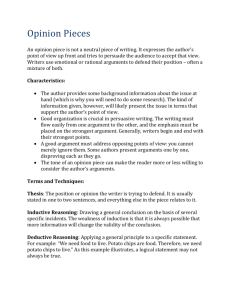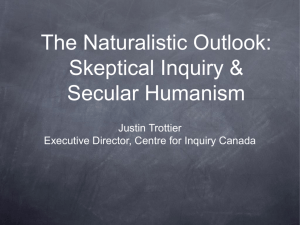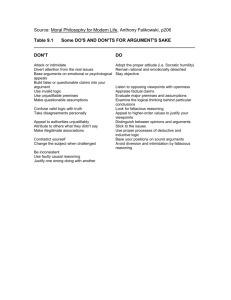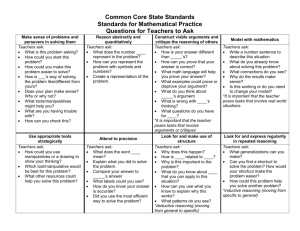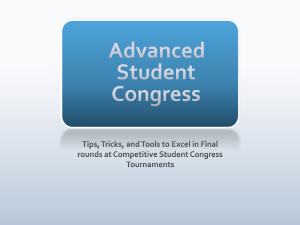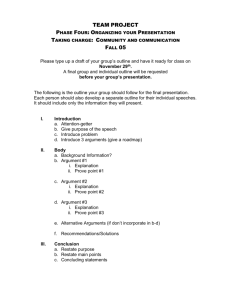Do gods love pious actions simply because the
advertisement
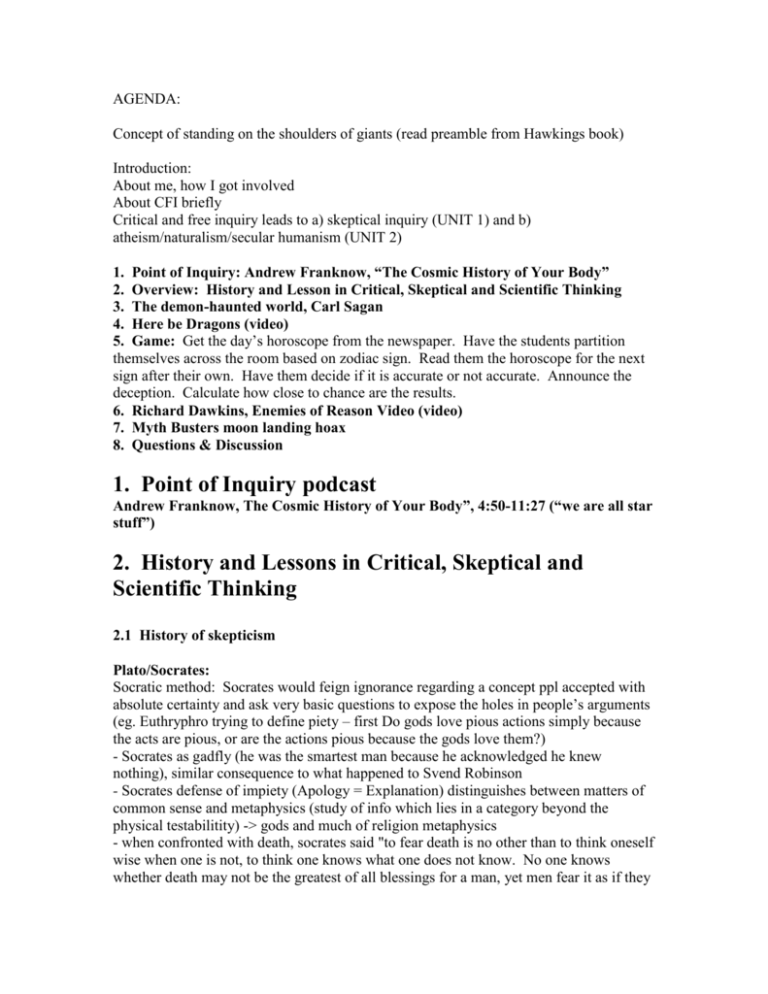
AGENDA:
Concept of standing on the shoulders of giants (read preamble from Hawkings book)
Introduction:
About me, how I got involved
About CFI briefly
Critical and free inquiry leads to a) skeptical inquiry (UNIT 1) and b)
atheism/naturalism/secular humanism (UNIT 2)
1. Point of Inquiry: Andrew Franknow, “The Cosmic History of Your Body”
2. Overview: History and Lesson in Critical, Skeptical and Scientific Thinking
3. The demon-haunted world, Carl Sagan
4. Here be Dragons (video)
5. Game: Get the day’s horoscope from the newspaper. Have the students partition
themselves across the room based on zodiac sign. Read them the horoscope for the next
sign after their own. Have them decide if it is accurate or not accurate. Announce the
deception. Calculate how close to chance are the results.
6. Richard Dawkins, Enemies of Reason Video (video)
7. Myth Busters moon landing hoax
8. Questions & Discussion
1. Point of Inquiry podcast
Andrew Franknow, The Cosmic History of Your Body”, 4:50-11:27 (“we are all star
stuff”)
2. History and Lessons in Critical, Skeptical and
Scientific Thinking
2.1 History of skepticism
Plato/Socrates:
Socratic method: Socrates would feign ignorance regarding a concept ppl accepted with
absolute certainty and ask very basic questions to expose the holes in people’s arguments
(eg. Euthryphro trying to define piety – first Do gods love pious actions simply because
the acts are pious, or are the actions pious because the gods love them?)
- Socrates as gadfly (he was the smartest man because he acknowledged he knew
nothing), similar consequence to what happened to Svend Robinson
- Socrates defense of impiety (Apology = Explanation) distinguishes between matters of
common sense and metaphysics (study of info which lies in a category beyond the
physical testabilitity) -> gods and much of religion metaphysics
- when confronted with death, socrates said "to fear death is no other than to think oneself
wise when one is not, to think one knows what one does not know. No one knows
whether death may not be the greatest of all blessings for a man, yet men fear it as if they
knew that it is the greatest of evils. And surely it is the most blameworthy ignorance to
believe that one knows what one does not know. It is perhaps on this point and in this
respect that I differ from teh majority of men, and I I were to claim that I am wiser than
anyone in anything, it would be in this, that, as I have no adquate knowledge of things in
the undwerworld., so I do not htink I have" Plato, the apology
- "let us reflect in this way, too, that there is good hope that death is a blessing, for it is
one of two things: either the dead are nothing and have no perception of anything, or it
is, as we are told, a change and a reolocating for th soul from here to another place. If it is
comlete lack of perception, like a dreamless sleep, then death would be ag reat advantage.
For I think that if one had to pick out that night during which a man slept soundly and did
not dream, put beside it the othe rnights and days o fhis life, and then see how many days
and nights had been better and more pleasant than that night, not only a private person
but the great king would find them easy to count compared with the other days and
nights. If death is like this I say it is an advantage, for all eternity would then seem to be
no more tan a single night. If, on the ohter hand, death is a chagne from here to another
place, and what we are told is true and all who have died are there, what greater blessing
could there be..."
- "the unexamined life is not worth living"
The Ancient Skeptics (The Pyrrhonians)
- skeptic does not mean doubter, greek skeptikos means inquirer or investigator
(magazine skeptical inquirer)
- academics concerned with methodological attacks on dogma while academics while pre
and post with practical guide to life
- skepticism - like science - is finding a balance between blind acceptance and absolute
skepticism (mention postmodernism vs religious absolutism)
1. The pre-academics
- in what relation do we stand to things around us?
- epoche is the suspension of assent or belief, detachment of belief, withholding of belief
in the face of equally plausible or implausible claims regarding the inner nature of things,
ie agnosticism with respect to metaphysical things, but NOT with respect to practical
affairs
- this detachment of bleief (epoche) should lead to a state of tranquillity of the mind and
abstention from fanaticism and moderation in the face of the massive unyielding forces of
nature like death and catastrophes (greek concept of moderation)
2. The Academics:
- distinction between metaphysical matters which can not be rsolved by any rational or
empirical means and common sense matters which one must deal with
- systematic attacks against dogmatic positions (not merely beliefs, but theoretical
doctrines, tenets or principles held true regardless of disconfirming evidence and which
can't be wrong)
- with respect to dogma, Arcesilaus said "when a 'wise man' points to a given perception
and calls is the truth, we follow him and also call it the truth; but when a fool points out a
given perception and calls it the truth, we laugh at him, call it an illusion. But this is to
beg the whole question about what is the truth: We have no criterion for deciding who is
indeed the Sage [the wiseman] and who is the fool; and lacking an ultimate, universally
satisfactory standard, we cannot tell when we have indeed before us or when we have
representations that only look certain. And so we should engage in epoche with respect to
such perceptions, and should suspend judgement upon their truth"
- like moving around a dark room with various objects and trying to find one made of
gold – we may believe metaphysical theories which are ultimately true but we would
have no necessary conceptual and experiential capabilities to make this discernmen
eg: existence of life after death
- leads to humbling by acknowleding epistemological limitations
- separation of BIG T Truth from little t greatest contributions of skeptics
3. Post Academics
- accept guidance of nature and human senses but also accept limitations when it comes
to determining true nature of experiences
- metaphysical universal qualifier: due to universal epistemic constraints, when it comes
to speculation regarding any matter of metaphysics - including theology - we must
honestly and openly acknowledge our ignorance regarding such matters
- this creates egalitarian possibilities cause we are all equally ignorant of fundamental
reality, this is liberating and opens up possibilities for creating novel ways to understand
ourselves and our place in the world, we clear the theological descriptions to allow
bottom up approach through common sense/science
- The Cross of Reason (use image from Pain in the ass book) (information in the Big T
the claimant has the burden of responsibility to demonstrate why anyone should believe it
- as Christopher Hitchens said "that which is asserted without evidence can be dismissed
without evidence" check exact quote)
- religion and BigT truths important to people cause they answer fundamental questions:
1. who/what am I (personal identity)
2. why am I here? (teleology - meaning of life)
3. how should I behave? (morality/ethics)
4. what can/do I know? (epistemology)
5. what is to come of me? (teleology)
2.2 Forms of Reasoning
1. Analogical
A is observed to be like B in certain respects (eg. compare new berries with old ones by
shape, colour, texture, etc to tell if poisonous) - they could gain food and knowledge of
what to eat in future, or gain knowledge of poison and not eat in future -> humans
experience would with cosntantly evolving dtabase of information which we use to make
comparisons, categorize, analyze etc and grow regularities of nature to survive
2. Three laws of thought (comparative cause they distinguish things or states of
being from each other):law of identity, non-contradiction, excluded middle
a. Law of identity:
x is x where x refers in both cases to the same thing ast the same time and in the same
respect, can be used to communicate a single thought in different ways it is wrong to do x
means we should not do x
politicians use this to say nothing - can I find examples in current election?)
b. the law of non-contradiction:
statement or state of being and negation cannot both be true, statement can't be both true
and false
c. law of excluded middle:
a meaningful claim is either true or false
- reflective ignorance is a form of reasonsing in which we self -reflect to identify gaps in
our knowledge and form a relationship with our beliefs so we can attempt to fill them
- how did reasoning evolve: evolution - if we could reason that if 2 tigers go into a cave
and only 1 reemerges it should be avoided
- laws of logic, fallies, rules of scientific reasoning (eg. probability theories, statistics,
deduction, induction)
2.3 Building an Argument
1. propositions (statements that are either true or false) build arguments -> premiss and
conclusion, both must be present
a. simple argument: one premise infers to general conclusion
premise indicators: since, as indicated by, if, because, the reason is, for, as, given that
conclusion indicators: therefore, hence, thus, so, accordingly, then, establishes
conclusions can act as premises for other conclusions
PREMISSES (your reasons for maintaining) -> CONCLUSION (your position)
- if premise is false conclusion is false
- to recognize an argument, first determine conclusion then check if premises are good
enough to support it
- premise can be hidden - like advertisements with premise that you want to fill the hole
the product is being marketed for
- conclusions can be main and subsidiary (show flow chart)
- premisses can suppport conclusions as converging separately or linked in support in
which they can not independently work (show different flow chart diagrams) - I can do
test with commercials and newspaper editorials to spot arguments
To critically analyze arguments:
1. Look for indicator words. Determine whether they are premiss-indicators, conclusionindicators, or neither
2. determine the conclusion, the main conclusion
3. separte noise from premis and mark
4. determine whether the premises separtelly, jointly or both support conclusion
5. using a legend, diagram the relationship between the premises and clusion
6. check argumen to ensure t here are no implied or hidden premises or conclusions
Abbreviated argument: one or more premisses or conclusions are absent -> concept of
conceptual clarity means don't leave anything hidden
2.4 Modes of Reasoning
1. Deductive Arguments: Sound argument if premises are true (content) and support
conclusion properly (structure)
- argument formally valid (but not necessarily true cause of content) if structurally it is
deductive
eg. syllogism: 3 lined argument in which conclusion is inferred from two premisses
pg. 102-104 valid and invalid argument patterns with examples (can I do a game with
this)
2. Nondeductive arguments
- conclusion not formally valid but probably or likely (eg. probabilities, statistical
sampling, polls) -> use example from election polls
a. inductive generalization (ex scientific reasoning) - beware sampling bias (eg.
unrepresentative by only asking from a special subset of all people, and if we have
enough people asked)
b. statsitical syllogism: going from sample of a group to an individual of the group
c. induction (causal reasoning): scientific reasoning based on a hypothesis/educated
guess, leading to use of empirical tests through senses and equipment by making
induction style predictions from general to particular and attempting to falsify them
Observation->Hypothesis->prediction->experimental data->observation (confirmation or
falsification)
Probability can be hightened by appealing to criteria:
1. acceptability: whether the premises are accepted, rejected or we suspend judgement
a. personal testimony entails only provisional acceptance and depends on who said it
b. appeal to authority, which must be secondary to premisses based purely on sound
reasoning, and should be based on person's experience or education, recognized as
authority by peers in the profession, and must be unbiased in the situation
c. A priori truth ("from the first") true by definition or logic compared to a posteriori
("from the posterior, or afterward) which require evidence and experience
d. common knowledge - only provisionally
Reasons to reject premisses
a. inconsistencies (use with a game)
b. begging the question - assuming as a premise your conclusion (the word of the bible is
true cause it says in the bible that it is the word of god and god wouldn't lie)
also watch out for language problems
a. euphomisms which attempt to substitute mild or indirect terms for harsher ones can
distort (eg. police action = war, clean bomb = neutron bomb)
b. vagueness and ambiguity: term without precise meaning or with multiple meanings
c. fallacy of equivocation: can cause a verbal dispute rather then a real one, both sides
must agree on what they each affirm and deny
d. false dichotomoy: presenting evidence to mislead us into thinking there are only two
alternatives
2. relevance: premises can be positively relevant, negatively or neutral
ex. hiring jones: he is conscientious, he occasionally steals, he can do gymnastics
irrelevance: disanalogy/false analogy/non-sequitur
strawman argument: misinterpreting someone's argument and then analyzing that leads
to irrelevant commentary
red herring argument: using premiss taht is irrelvant to conclusion as distraction
ad hominem attacks ("against the man") instead of attacking argument we focus on
irrelvant qualities or characterisics of person, invalid except for person's credentials or
bias or expertise when they are an authority
Tu quoque fallacy ('2-kwo-kway); you too
appeal to force: ex parents telling you to do something cause they said so and they make
the rules
appeal to pity: affirmative action is an irrelevant appeal to pity!
appeal to popularity: majority often wrong, only acceptable in fields of specialty with
rigorous peer review that uses other good arguments
3. evidence adequacy
determine how strong or general claim is then how much evidence is adequate
argumentative maturity: present refutations to other side, allow other side to speak
Fallacies of adequacy
slippery slope fallacy: metaphor describing compounding effect or long term
consequences of our actions
- to determine if good argument, does A initial really lead to X final and is X bad?
Argumentum ad Ignorantiam (argument to ignorance) - use inability to esablish truth of a
proposition as evidence for its falsity or inability to esbalish falsity as evidence for truth
(used by creationists, or used by UFO or ghost hunters) - use in game?
- we can only make this argument if we have taken responsible steps to determine its
opposite/thorough investigation of both sides
2.5 Scientific reasoning
- science comes from latin scire "to know"
- science can deal with purely academic or intellectual concerns and more practical
concerns
- scientifc reasoning the most popular form of attaning knowledge concerning cause and
erffect relationsips of physical world, element of universality and
objectivity, track record of success, greatest explanatory pwer of all methocds of knowing
- correlation does not imply causation (coincidence, chance, hidden cause) cause our
minds are evolutionarily honed to see causation
causality: necessary condition (eg. oxygen for combustion) not cause, sufficient condition
brings about the effect is called the cause (eg. lit cigarrette mixed with oxygen and leaves
causes fire)
- double blind experiments increases objectivity: neither the researchers nor the subjects
are aware of who are inthe control grou and the test group (can I do experiment with
childeren?) use with placebo in medical tests
explanations: hypothesis (educated guess, working idea to explain particular phenomenon
accepted tentatively), model (analogy, like a map or DNA double helix), theory
(strongest type of scientific explanation, well developed and confirmed explanation), law
(rules by which things function, general principles in which to understand particular
instances)
-scientific method - given above, plus look at competing hypotheis to decidew which is
most reasonable
- ex what killed dinosaurs: disease - but prediction of bacteria in fossils not found, ice
age would predict core samples would be colder, meteor would have iridium in core
samples)
- pseudoscience: generally appeal from ignorance, psudo = fake or not real -> CSICOP
- double blind test
Construct good arguments:
epistemic responsibility
1. get facts right
2. be fair: acknowledge biases and those of others, present evidence on both sides
3. reflect on your beliefs - be good skeptic keep mind open to other side
practical
use indicator words
use simple terms- say as much with as few words
avoid hidden arguments, vague or ambiguous expressions
diagram arguments
watch for fallacies
prsent balanced case
3. Carl Sagan, The Demon Haunted World
Pass out excerpt and read from pg 202, 207-216
”Extraordinary claims require extraordinary evidence (Carl Sagan)”
4. Video (Here Be Dragons: critical analysis of pop
phenomena)
00:00-01:30
2:45 individual reports
6:10-7:15: “you’ll often here me use the word pseudoscience”
10:30 (“confirmation bias”) – 19:55 (suppression by authority – counterargument
to Expelled movie) NOTE: remove 12:35-15:39
25:18-27:00
27:00-29:20
33:55 “act globally” – 34:55
37:50-39:40
Final Comments - What to do?
Look out for keywords in redflags: ancient wisdom, energy fields, all natural, lab coats
Research online but check sources – check Wikipedia for critcism/skepticism section and
follow links
6. Richard Dawkins, Enemies of Reason Video (video)
00:00 – great accomplishments of science with chanting in back
2:45: fruits of science
5:00 astrology
13:30 psychic mediums
(or 12:45 – 19:40) follow from astrology after game
17:10: critic of mediums Darren Brown
19:55 spiritualist churches
24:30 people get addicted, return crowd to mediums
26:35 science based on cumulative build up of evidence (eg. Bigfoot evidence
unchanged)
28:25 dowsing
30:20 double blind tests of dowsing
33:30 irrational belief based on attributing spirit/intention to inanimate objects
35:00 gambling
37:40 “spiritual” -> spiritual books outnumber science books 3 to 1
41:15 science bleak outlook, mundane = mundus= world, wonderful not dull
42:08 fall of science, education issues, postmodernism
7. Myth Busters moon landing hoax
http://www.youtube.com/watch?v=Wym04J_3Ls0&feature=related
Homework
Read newspaper, find examples of good vs. bad arguments
Possible Additional Content
Critical thinking about contemporary issues: Svend Robinson proposed removing God
from Charter of Rights / In God We Trust on US money
critical thinking would ask such questions like:
to which god does the charter refer?
what interpretation of a particular god do we accept
in what capacity does such a god have authority? Can I ask to be judged by my
individual interpretation of god? Give examples
does this statement infringe upon the rights of atheists and agnostics
what of church state separation
circularity of relying on statements confirming bible’s veracity in bible itself
